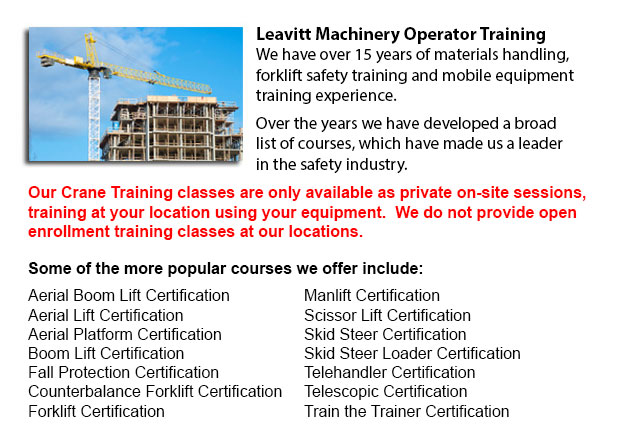
Surrey Crane Operator Certification - The process to enable you to be able to operate particular kinds of cranes is to take crane operator certification training to acquire certification. The certification process consists of hands-on practice, classroom learning and an ability assessment. Various training programs are available for mobile cranes, overhead cranes, tower cranes, forklifts, boom trucks and several hoisting machinery. Trainees will learn the basics of equipment characteristics, safety, and operational practices related with these kinds of cranes.
Customized Practical Training and Evaluation:
Companies can request customized practical training and evaluation on-site at the work facility after the in-class session. Two operators will be trained at a time by an instructor. The duration of time considered necessary for training will vary depending on equipment kind and the employees' levels of ability, but generally needs an hour or two. The training will concentrate on practical skills such as planning the lift, right rigging practices and safe operating procedures. Employers must pre-schedule the on-site session.
After in-class instruction, practical operating instruction and evaluation, and written examination, the trainee would receive an individual wallet certificate and the company would receive a wall certificate. To be able to achieve certification, trainees need to have an 80 percent passing score on both practical and written tests.
The program consists of: Manuals, regulations and policies; hazards of high voltage; safety issues; signals and communications; emergency rescue procedures; components, terms and types; pre-operational check; crane capacity and configuration; pre-lift set-up and planning; hammerhead / luffing jib crane operations; wire rope and rigging; fall protection; climbing cranes; CPR & First aid; WHMIS and crane maintenance.
The minimum basics for becoming an overhead crane operator consist of possessing the physical and mental capability considered necessary to perform crane work. Essential capabilities include normal field of vision, depth perception, manual dexterity, reaction time and coordination. Prospective operators should not have the tendency to become lightheaded. Operators who do not already have proof of qualifications and experience should acquire certification. Operators need to be qualified to operate the specific kind of machinery that they would be making use of to perform their task.
-
Surrey Zoom Boom Training
Surrey Zoom Boom Training - Zoom Boom Training focuses on properly training prospective operators on variable reach forklifts. The training goals include gaining the knowledge of the equipments physics and to be able to define the job of the operator... More -
Surrey Boom Lift Operator Training
Surrey Boom Lift Operator Training - The cherry picker work platform is a kind of work platform, which would typically include a bucket or platform at the hydraulic lifting system's end. The device is also called a boom lift, man lift, hydraladder or... More -
Surrey Forklift Training Program
Surrey Forklift Training Program - The lift truck is a common powered industrial vehicle which is in wide use these days. They are sometimes referred to as hi los, lift trucks or jitneys. A departments store will use the forklift to load and unload m... More -
Surrey Forklift Operator Certification
Surrey Forklift Operator Certification - Forklift operator certification is usually needed for employees working in industrial, warehouse or construction environments to guarantee the safe utilization of forklifts. Workplace training must follow a me... More -
Surrey Heavy Equipment Ticket
Surrey Heavy Equipment Ticket - Depending on the nature of the task at hand, the kind of construction equipment which a heavy equipment operator utilizes differs. Every kind of equipment is built to carry out particular tasks in the most efficient ma... More -
Surrey Order Picker License
Surrey Order Picker License - Order preparation operation or also called order picking as it is more commonly known is a process utilized in warehouse operations and consists of staff called order pickers. The order picker's task is to take and colle... More -
Surrey Boom Lift Safety Training
Surrey Boom Lift Safey Training - Boom lifts are a type of elevated work platform or aerial lifting device which are normally utilized in industry, warehousing and construction. Boom lifts can be utilized in virtually whichever environment due to the... More -
Surrey Heavy Equipment Operator Classes
Surrey Heavy Equipment Operator Classes - An individual who has the proper training in order to make use of a particular type or piece of machine is called an equipment operator. There are different ways that an equipment operator could become traine... More

Forklift Certification Surrey
TOLL FREE: 1-888-254-6157
24389 Fraser Highway
Langley, British Columbia
forkliftcertificationsurrey.com
Email Us
About Us



